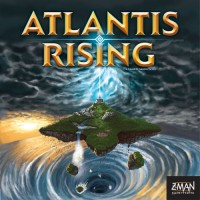
Atlantis Rising
Overview
Atlantis Rising depicts the final hours of that very famous (very doomed) island city. Players take the roles of specific Atlantean councilors that must rally the people of Atlantis, gather resources and build a Cosmic Gate that will transport the island to safety before the icy waters of the ocean envelop this advanced civilization. Designed by newcomer Galen Ciscell, Atlantis Rising offers a very specific challenge to the players: overcome despair and succeed together or perish!
Gameplay
The game begins with the sun shining, and the smell of optimism on the breeze as players are assigned or choose an Atlantean councilor for the game. Each character has a specific ability that grants a bonus to that player during the game. The players also begin with three Atlanteans they will use to gather resources to build the 10 components that comprise the Cosmic Gate.
The game board is assembled much like a jigsaw puzzle with six distinct regions of six tiles that stretch out toward the balmy seas. Each region will provide a specific resource to players during the game.
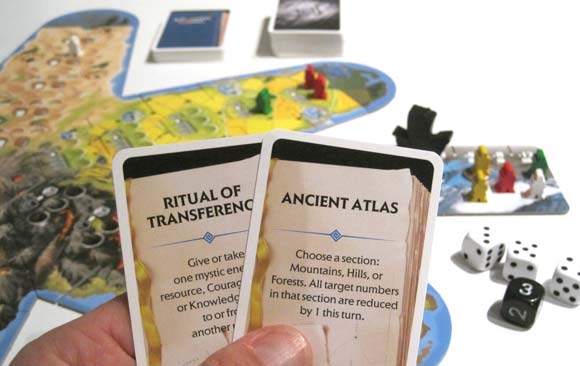
A turn is comprised of five phases that all players complete in player order before beginning the next phase.
Place Atlanteans: Players assign their Atlantean meeples to an area of the board to gather a resource. The resources are: Crystal, Gold, Ore, Knowledge cards, Mystic Energy, and Atlantium, a rare metal that is processed from ore.
Draw Misfortunes: Each player in player order draws the top card from the misfortune deck which in most cases, floods a tile on one region of the island – from its furthest point moving inward. Other cruel catastrophes can occur as well: earthquakes, mass panic etc. In some cases, if your Atlantean was places on a tile and it floods, you do not get to collect your resource.
Productive Actions: If your Atlanteans survive the misfortunes you may now attempt to collect the resource(s) that their placement dictates. In the Hills, Mountains and Forest – players must roll equal to or higher than the number shown on the tile to collect Gold, Ore, or Crystal respectively. In the Libraries, players may draw a Knowledge card that can be used to the players’ advantage. In the Forges, players automatically process their Ore into Atlantium and in the City they may collect another Atlantean meeple to gather resources. Atlanteans may also be allocated to the Navy Board, to defend the island against the attacking Athenians. Finally, on the center tile they may collect one Mystic Energy token. Mystic Energy gives the players several game changing options: spending one Mystic Energy allows a player to add one to a die roll, spending three allows a player to cancel a misfortune card and so on.
Athenians Attack: During this phase, the greedy Athenians attack the island trying to flood the hapless island further. A die is rolled and compared to the number of Atlanteans placed on the Navy Board. If the result is a positive number, this many additional tiles flood. The Atlanteans don’t get any breaks.
Build Components: Player may build one component of the Cosmic Gate by trading in their collected resources and taking one component from the Blueprint. The Components have a one-time effect that can benefit the players at this time.
If the players manage to build all ten components before the last (center) tile floods, Atlantis is saved! Otherwise… well… you know the legend.
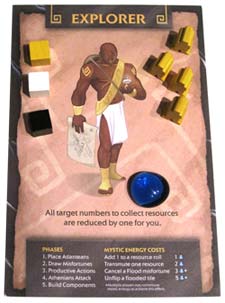
Components
The art and game component quality are good. The game board fits together well and is easy to manipulate. The player character sheets are a bit thin, but each has a turn phase and Mystic Energy reference chart, which is always welcome for newer players. As with most Z-man Games titles, the rulebook is excellent. Pictured and numbered components, a 2-page game set-up image with component reference, easily numbered phases and additional rules formatting. With just enough flavor text included (in short digestible paragraphs) as not to bog down the rules, but accessible if you want them.
Learning Curve
Thanks to the well-written rulebook and very simple game phases, Atlantis Rising can easily be taught in 10 minutes. Mastering the art of cooperation is however another thing and this game demands players that work well together.
Who would enjoy this game?
Final Thoughts
This game is hard. It’s also irresistible.
Designer Galen Ciscell has taken a cooperative / apocalyptic game theme (saving Atlantis) and infused it with worker-placement mechanics that support the theme perfectly. The game turns are streamlined and simple to navigate (get it?). As with most co-op games, player personalities and interaction are key to the game’s enjoyment and success. But there is something more here. In other co-ops, (Knizia’s Lord of the Rings, Pandemic, Forbidden Island, Elder Sign, etc.), you feel that if you as players cooperate and do the right things in the right order, all will be well. Math and a low level of random elements stand between you and success. You compete against time and a programming built into the game. Once you unlock the dominant strategy, success! But Atlantis Rising has a high level of random elements: rolling to gather resources, a nasty misfortune deck, and variable attack rolls for the Athenians. This makes you prepare for the worst, but in inevitably you will feel victimized by cruel fate. This produces intense anxiety and emotion.
In many ways, games are like movies. They are designed to provide a specific experience to the audience, evoke a reaction and take us on an emotional journey. Whether the games are themed or not, they compel us and challenge us to react; sometimes with cool strategic calculation, sometimes with whimsy and other times with fear or tension. Games are an art form that compels us to feel, just as much as any Academy Award winning film.
Atlantis Rising takes players on a very specific emotional journey. Optimism is high when the game starts. Then you see your island and your spirits slowly washed away as fewer and fewer resources are available. The dreaded Athenians keep on their relentless (and escalating) assault. Then you feel it: hopelessness (which also happens to a be a Misfortune card in the game). You can’t possibly win. As players you must unite to decide the game can indeed be won. Inevitably, players must rise above the hopelessness. Win or lose, players walk away with a memorable, emotional game experience.
The game is hard. That’s a good thing. It must be difficult – almost unachievable to foster the emotional journey described above. Atlantis Rising has a low win percentage due to its high level of random elements. The wrong card at the right time (or vice versa) can make you sink or swim (or in this case – just sink). This makes the game very replayable and frustrating – almost as if it’s not meant to be won. The emotional journey is powerful and enticing. It will play with your emotions, challenging you to be the better gamer and overcome hopelessness. If this is the type of game experience you crave, you may wish you never win.
User Reviews (2)
Add a Review for "Atlantis Rising"
You must be logged in to add a review.


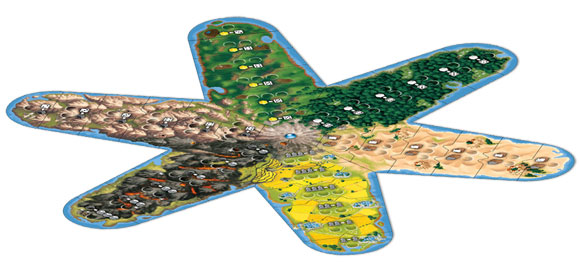
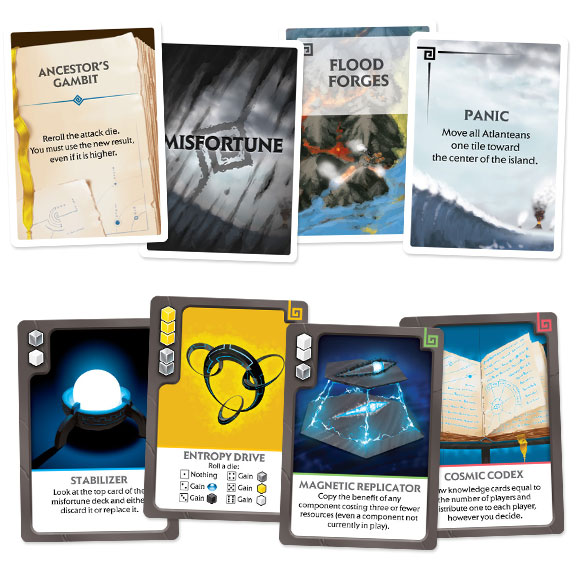
I played this at Gencon. We had a full table. The person that was at the Z-Man games booth doing the demo went to lunch after getting the 6 of us set up. The person that was supposed to guide us for the rest of the game went MIA. So we did the best we could with the rule book.
We sincerely feel the game is broken. There is not much of a chance to win the game whatsoever. The purpose is to make sure Atlantis does not sink.
However, with each turn there are 6 misfortune cards drawn. Inevitably, your areas are going to sink due to these cards. Also, you have to fight the Romans with every turn as well. You get some “meeples” to help you try and save Atlantis but creating resources to keep Atlantis from sinking. However, the number of meeples are sparse when you have to add your meeples to the Roman war card to help prevent the Romans from sinking Atlantis as well.
See how confusing this gets? It’s indeed hard and it’s indeed frustrating.
If you want to a game where you cooperate, great! If you want a game where you cooperate AND still fail? THIS IS THE GAME FOR YOU!
I played this at Gen Con 2012 and I will abstain from my opinions and keep to the actual demoing and stick to game thoughts. That said if we would have had more representative input it might get a better rating.
The game is broken, there is apparently no way to win and you truly are fighting a losing battle. It is nigh impossible to manage resources, fight Athenians and somehow stave off the impending doom of sinking.
This might be appropriate considering you think Atlantis and Titanic and you invariably now the fate of each.
Perhaps the hubris that sunk both and how you can’t win AR are a bit of meta-gaming that was accomplished subconscioulsy by the game designers?